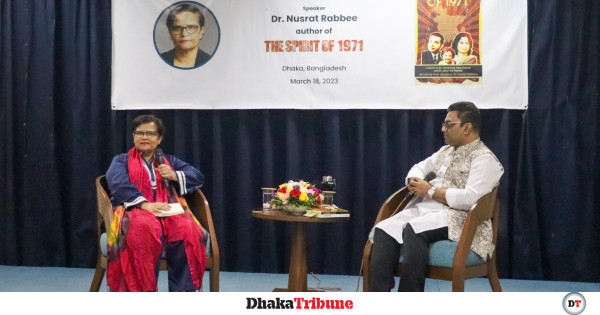Dr Nusrat Rabbee, daughter of a martyred intellectual cardiologist, spoke at ULAB about the need for international recognition of the genocide that occurred during the Liberation War of Bangladesh. She highlighted the lack of attention given to the genocide and the ambivalence of the international community towards the atrocities committed by the Pakistan army. Dr Rabbee urged scholars, politicians, diaspora, and lobbyists to work together to set the history straight and gain international recognition for the genocide. She also called for the restoration of the spirit of Bangladesh, which momentarily lost its way in the post-1975 era. The event was attended by children and family members of freedom fighters and other dignitaries, and was organized by ULAB’s lit salon and English department. The French ambassador to Bangladesh, parliamentarians, and members of ULAB’s Board of Trustees were present at the event.
Dr Nusrat Rabbee’s Call for International Recognition of Genocide in Bangladesh’s Liberation War
Dr Nusrat Rabbee, the daughter of a martyred intellectual cardiologist, Dr Fazle Rabbee, spoke about the need for international recognition of the genocide that occurred during the Liberation War of Bangladesh. She highlighted the lack of attention given to the genocide and the ambivalence of the international community towards the atrocities committed by the Pakistan army.
During an event discussing her memoir, The Spirit of 1971, Dr Rabbee reflected on the role of the intellectual martyrs in shaping the cultural, social, and political fabric of the country. These martyrs were targeted during the third phase of the Pakistani attack, known as ‘Scorched Earth’, when the colonizers felt that their rule was coming to an end.
Dr Rabbee pointed out that the number of casualties over the nine months of the war could only be compared to the holocaust during the Second World War. Yet, this genocide is largely ignored by the western media. The genocide of Bengali people is unique because of the strategic attempt to obliterate the people’s resistance through the killing of the masses, cleansing of the Hindu minority, and weaponizing of rape.
Dr Rabbee mentioned that the US support for Pakistan during the war, along with academic resistance from Pakistani scholars, have not allowed the genocide in Bangladesh to be talked about with the attention it needs. She urged scholars, politicians, diaspora, and lobbyists to work together to set the history straight and gain international recognition for the genocide.
Dr Rabbee’s discussion with Prof Shamsad Mortuza, the special adviser to the ULAB board of trustees, also called for the restoration of the spirit of Bangladesh, which momentarily lost its way in the post-1975 era.
The event was organized by ULAB’s lit salon and English department and was attended by many children and family members of freedom fighters and other dignitaries. The opening remarks were given by Sudeep Chakravarti. The French ambassador to Bangladesh, parliamentarians Suborna Mustafa and Nahid Ezahar, and members of ULAB’s Board of Trustees were present at the event.
Don’t miss interesting posts on Famousbio










